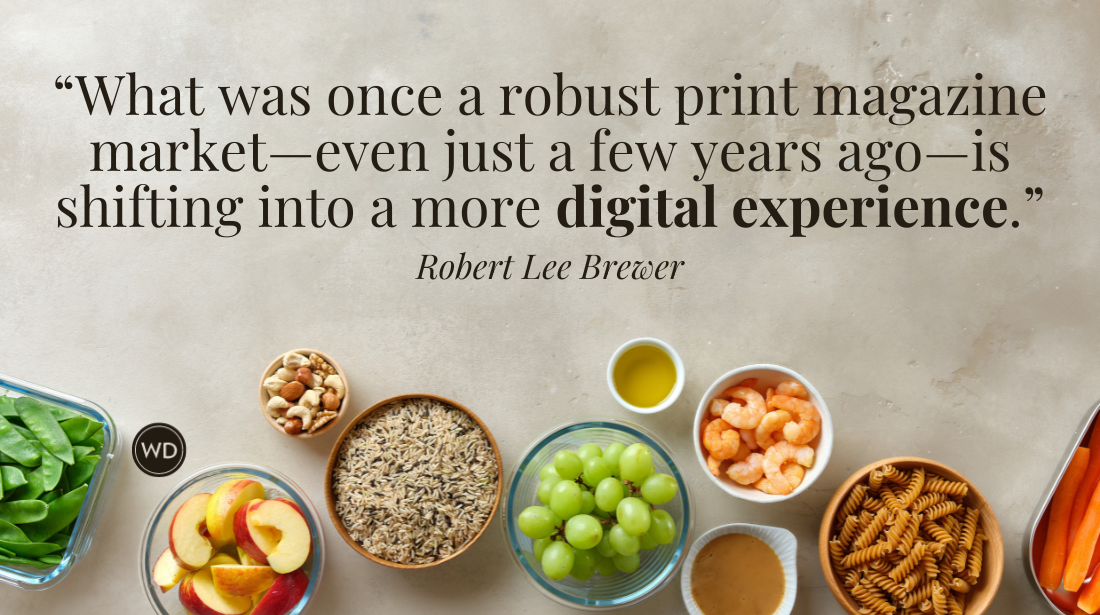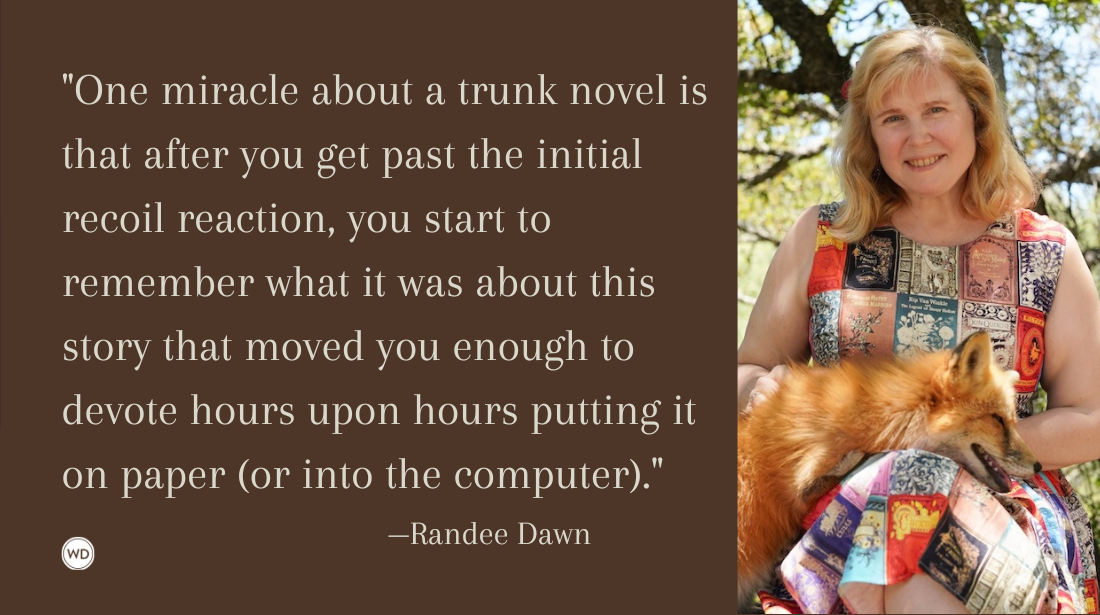8 Strategies to Build Your Freelance Writing Career
BY ROGER MORRIS Use these 8 strategies to turn occasional assignments into steady paychecks.
When I became a part-time freelancer in the 1970s, I scrambled to sell a few articles, mainly to my local newspaper’s Sunday magazine. With a full-time day job, it was rough. Telephone queries were discouraged, so pitches were laboriously snail-mailed, and I waited days or weeks to see if anything other than rejection slips appeared in my mailbox. Eventually, I resigned myself to my corporate career, landing the occasional magazine byline on the side.
—By Roger Morris
But I started seriously writing again about 15 years ago. And after some successes, I made the decision to transition into full-time freelancing. In 2012, I sold 76 articles to 15 publications and co-authored a regional cookbook with my photographer wife, Ella. It was a very good year.
But wait—aren’t print publications becoming tenuous markets? It may seem counterintuitive, but now is a great time to be a freelancer. Here’s why:
1. There are still plenty of magazines around. It seems as if two are born every time one dies. And since most can’t afford in-house writing staffs, they depend on no-overhead freelancers for more content than ever before.
2. Barriers to entry have fallen. It used to be a Catch-22: You needed clips for an editor to give you a chance—and to get clips an editor needed to give you a chance. To some extent, that’s still true, but now anyone can blog or otherwise “publish” work online, allowing inexperienced writers to display their skills.
3. Freelancing has never been more efficient. Queries can be sent and answered within minutes. Researching and fact checking are faster than ever thanks to the Internet.
Not that everything is smiles and sunshine. Because more people are writing, competition is intense. And with slimmer budgets, assignments aren’t always as lucrative as we’d like—some online venues pay poorly, and many print publications no longer reimburse the expenses they used to (travel, meals, etc.). It’s also true that just because editors can respond to an email pitch promptly doesn’t mean that they always do.
Still, it’s a good time to be bullish about building your business, whether you write full time, part time or somewhere in between. Based on my own experiences and those of other successful freelancers I’ve talked with, here are some tips on how you can supercharge your sales:
1. Choose to specialize or generalize.
Early in my career, I loved the idea of being someone who could write about anything. But now, about 80 percent of my freelance work is focused on wine, food and travel.
Experience has taught me that if you write primarily for local or regional publications, or if you have a day job and write only occasionally, it’s best to be a generalist. Part-time or regional writers need every opportunity for assignments they can get. But if you want to write full time or in the national arena, there are efficiencies in choosing a specialty. Specialists become part of a community of targeted media, producers of goods, and PR agencies—and through that community one assignment can more easily lead to another.
Alanna Nash, a veteran music writer and book author based in Louisville, Ky., says this approach was key to cultivating her stable freelance business. “Establish yourself as an expert in one field—or, in music, one genre—so that editors think of you whenever the subject comes up. That way, they contact you, instead of the other way around.”
2. Cold-call like a pro.
If you are to extend your reach as a writer, obviously you must pitch stories to editors you don’t know. But there are ways to make this easier and more successful. First, keep a positive attitude and don’t take rejection personally. It happens to all of us.
Second, be professional in a casual medium. A basic, well-written email query for a strong article idea is the tried-and-true way that most first assignments are won. But it’s not the only way. “I always start with an email to the editor explaining who I am and with three short, concise article ideas,” says Austin, Texas–based travel writer Stirling Kelso. “That often opens the door.”
Another approach that’s sold articles for me is sending a short introductory note inquiring if an editor is receptive to pitches from new freelancers. The logic is simple: You’re asking her only to accept you as a potential contributor, not to assign an article. If she says “yes,” I follow up with ideas while the connection—however tenuous—is still fresh.
3. Generate ideas—lots of ideas.
Ideas are the currency of freelancing, and the rule of thumb of needing to pitch five to 10 for every article you place is pretty on target for most of us.
But you can train yourself to be better. For example, once you’ve had a few articles published you’ll probably find that you occasionally get invited to events—presentations, interview opportunities, even media trips. Take advantage of every invite that comes your way. If there’s an associated expense, consider it an investment in your business. Jot down possible story ideas in advance; this will prepare you to ask better questions on the spot. Then, attend with the goal of adding angles to your idea list. Using this approach, it’s not unusual for me to match a half-dozen ideas to a half-dozen different editors from a single event.
Of course, it’s not all about quantity. “I think it’s the originality of my ideas that led to part of my editorial appeal,” says Zurich-based travel writer Adam H. Graham, who makes a habit of seeking out unconventional approaches to any given topic. “It pays to be a little bit of a contrarian.”
4. Leverage what experience you’ve got.
Treat every personal experience or article written as a credential or building block. I got my start as a college newspaper editor. Then a favorite English professor invited me to review a novel without pay for a local newspaper, The Charleston Gazette. That “free” review
led to a paying job at the newspaper. Years later, I
became interested in wine. I parlayed that into teaching a wine-tasting class, which led to a gig as a newspaper wine columnist.
Network to find opportunities that leverage these building blocks. I became friends with winemaker and wine marketer Bruce Neyers during the 1970s. Twenty years later, he urged me to contact his friend Colman Andrews, then editor of Saveur magazine, who gave me breakthrough assignments at the top of the wine and food category. Assignments build on one another. As Graham says, “My first New York Times piece changed the way editors thought of me, and opened a lot of doors. I suddenly had a voice.” Kelso says after her first travel publication in the The New York Times, “Editors I hadn’t seen in years came out of the woodwork.”
Publishing books also commands attention. Nash has written seven. “I seldom make any money off a book,” she admits. “That said, yes, you build your reputation that way and enhance your worth in the magazine market.” Similarly, you may be offered an assignment that barely covers your unreimbursed expenses. But if getting the article published in the right place will help you build credibility, consider it.
Always push your comfort zone, seeking assignments that stretch your skills. Experiences + networking + being fearless = moving to the next level.
5. Don’t hide behind your computer.
Generalists, by the nature of their business, build relationships with editors on a one-by-one basis. They don’t have a crucial need to build a reputation in any one arena. But for specialists, being seen often in print and in person is very important, and attending regional and national conferences in your specialty is a great way to make contacts.
It’s also important to get on the “A” and “B” lists of PR agencies representing leading companies in your specialty. PR people contact bylines they see in specialized magazines, or bloggers they stumble upon online. As a newer writer on the scene, it helps to befriend an established freelancer as a mentor. A younger writer I once met on a trip to Champagne, France, impressed me with her work ethic. She had limited PR contacts, so I recommended her to mine. You can also make PR contacts by using the website ProfNet’s (profnet.com) free resources for writers researching articles.
Even if you start on the “D” list, PR people hate empty seats at media events and will send you email invites to lesser ones—or even bigger ones if you don’t mind last-minute calls. Go. And when you sit next to someone important, open doors by exchanging cards and following up with simple “nice to meet you” notes.
There are no Internet dating services that introduce writers to editors. But PR pros love nothing more than making these connections. I now work regularly with three editors I met this way. Additionally, editors often speak at trade shows, and most are amenable to chatting with audience members when they come off the stage. They sometimes also staff exhibition booths for their publications along “media row” at these conventions.
If you don’t live in a big city, be part of the scene where local influentials hang out. Every small town has a big pond. Smaller cities also have their own media hubs. Freelancer Kelly Roberson works in Des Moines, Iowa, where the offices of Meredith publications are located. When visiting one editor, she tries to meet another. “Sometimes it’s as simple as walking into someone’s office and introducing myself,” she says.
6. Think in terms of relationship-building.
Editors want to work with writers who are accurate and who submit on or before deadline, help out the photo editor, aren’t rude with overly zealous fact checkers, and can be their “go-to” person when another writer fails to deliver. Focus on developing that professional relationship first.
But personal relationships also need to be tended. Kelso had a magazine staff job in New York before becoming a freelancer in Austin. “I try to get back to New York regularly, setting up meetings for two or three days,” she says. These meetings may be a quick coffee, a stop by the office or a full-scale lunch. “I know everyone is busy, so if someone isn’t available, I try to meet with a junior editor. You never know where they will show up one day.” Kelso also makes a point of remembering editors’ special interests, and forwarding pertinent articles and brief notes to stay in touch. This keeps you front-of-mind for more assignments, and when editors move to new publications, they’ll want people they know—such as you—writing for them there, too.
7. Find auxiliary writing & editing income.
Even the busiest writer will feel comfortable if she has a project that brings in steady money. That may be a consulting contract, a part-time job teaching writing, or work doing special tasks for magazines or freelance editing book manuscripts.
Writing bios and press releases for public relations agencies has kept more than one writer afloat. Additionally, writers who are specialists are often paid to speak at trade events. (Just avoid conflicts of interest—don’t write about people who employ you.)
In my specialty, many writers conduct consumer wine tastings, advise collectors what to stock in wine cellars and work shifts at bars or wine stores—all of which count as related experience!
8. Be smart about blogging & social media.
Blogging is a way to build credentials when you have none. And even if you’re an experienced writer, blogging for established sites can help you gain a foothold in a new area, even if you get paid little or nothing for it. A few caveats, though: It’s important to understand that not many bloggers make a living from subscriptions or selling ads. Blogging can also eat up time you could be using to sell articles, and if you’re not careful, can suck up your most salable ideas.
Social media can be very helpful when building your network and even researching articles, though you should exercise caution when it comes to the information you reveal online about your ideas and markets. Nash regularly taps into his social network of fellow writers, but stresses the importance of keeping it in its place. “I think you do that kind of thing in the morning, before you start writing. It gets you jazzed.”
Graham is mixed in his evaluation of social media’s worth. “Social media has never once gotten me a gig or a job,” he says. Nevertheless, he does use Facebook to post story links for “more exposure.”
Of course, every writer is different, so no one business plan works for everyone. But successful writers are always learning new tradecraft to help make their hard work pay off big.
Roger Morris is a Pennsylvania-based writer who specializes in articles on wine, food and travel. He regularly contributes to about 13 online and print publications, including USA Today’s Go Escape.
Thanks for visiting The Writer's Dig blog. For more great writing advice, click here.
*********************************************************************************************************************************
Brian A. Klems is the online editor of Writer's Digest and author of the popular gift bookOh Boy, You're Having a Girl: A Dad's Survival Guide to Raising Daughters.
Follow Brian on Twitter: @BrianKlems
Sign up for Brian's free Writer's Digest eNewsletter: WD Newsletter








